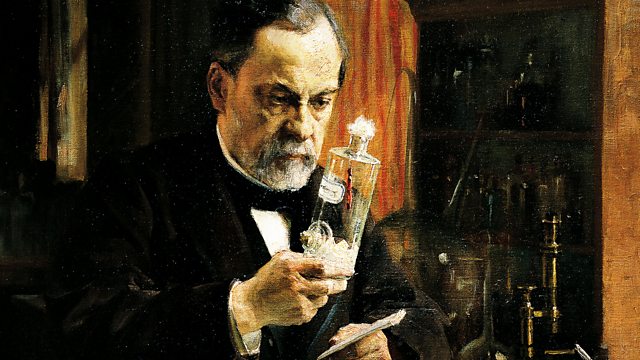Louis Pasteur
Melvyn Bragg and guests discuss the life and work of Louis Pasteur, microbiologist, developer of vaccines, saviour of the French beer and wine industries and preserver of milk.
Melvyn Bragg and guests discuss the life and work of Louis Pasteur (1822-1895) and his extraordinary contribution to medicine and science. It is said few people have saved more lives than Pasteur. A chemist, he showed that otherwise identical molecules could exist as 'left' and 'right-handed' versions and that molecules produced by living things were always left-handed. He proposed a germ theory to replace the idea of spontaneous generation. He discovered that microorganisms cause fermentation and disease. He began the process named after him, pasteurisation, heating liquids to 50-60 C to kill microbes. He saved the beer and wine industries in France when they were struggling with microbial contamination. He saved the French silk industry when he found a way of protecting healthy silkworm eggs from disease. He developed vaccines against anthrax and rabies and helped establish immunology. Many of his ideas were developed further after his lifetime, but one of his legacies was a charitable body, the Pasteur Institute, to continue research into infectious disease.
With
Andrew Mendelsohn
Reader in the School of History at Queen Mary, University of London
Anne Hardy
Honorary Professor at the Centre for History in Public Health at the London School of Hygiene and Tropical Medicine
and
Michael Worboys
Emeritus Professor in the History of Science, Technology and Medicine at the University of Manchester
Producer: Simon Tillotson.
Last on
LINKS AND FURTHER READING
��
READING LIST:
J. D. Bernal, Science and Industry in the Nineteenth Century (first published 1953; Routledge, 2005)
Patrice Debré (trans. Elborg Forster), Louis Pasteur (Johns Hopkins University Press, 1998)
René Dubos, Pasteur and Modern Science (Science Tech Publishers, 1988)
René Dubos, Louis Pasteur: Free Lance of Science (first published 1950; Perseus Books Group, 1986)
Emile Duclaux, Pasteur: History of a Mind (first published 1896; Cornell University Library, 2009)
Gerald L. Geison, The Private Science of Louis Pasteur (Princeton University Press, 1995)
Bruno Latour (trans. Alan Sheridan and John Law), The Pasteurization of France (Harvard University Press, 1988)
Staffan Müller-Wille and Christina Brandt (ed.), Heredity Explored: Between Public Domain and Experimental Science, 1850-1930 (MIT Press, 2016), especially ‘Message in a Bottle: Vaccines and the Nature of Heredity after 1880’ by J. Andrew Mendelsohn
Louise Robbins, Louis Pasteur and the Hidden World of Microbes (Oxford Portraits in Science, 2001)
Andrew Robinson (ed.), The Scientists: An Epic of Discovery (Thames and Hudson, 2012)
Donald Stokes, Pasteur’s Quadrant: Basic Science and Technological Innovation (Brookings Institution Press, 1998)
René Vallery-Radot, The Life of Pasteur (first published 1906; Palala Press, 2016)
Credits
| Role | Contributor |
|---|---|
| Presenter | Melvyn Bragg |
| Interviewed Guest | Andrew Mendelsohn |
| Interviewed Guest | Anne Hardy |
| Interviewed Guest | Michael Worboys |
| Producer | Simon Tillotson |
Broadcasts
- Thu 18 May 2017 09:00����ý Radio 4
- Thu 18 May 2017 21:30����ý Radio 4
Featured in...
![]()
19th Century—In Our Time
Browse the 19th Century era within the In Our Time archive.
![]()
Science—In Our Time
Scientific principles, theory, and the role of key figures in the advancement of science.
In Our Time podcasts
Download programmes from the huge In Our Time archive.
The In Our Time Listeners' Top 10
If you’re new to In Our Time, this is a good place to start.
Arts and Ideas podcast
Download the best of Radio 3's Free Thinking programme.
Podcast
-
![]()
In Our Time
Melvyn Bragg and guests discuss the ideas, people and events that have shaped our world.



